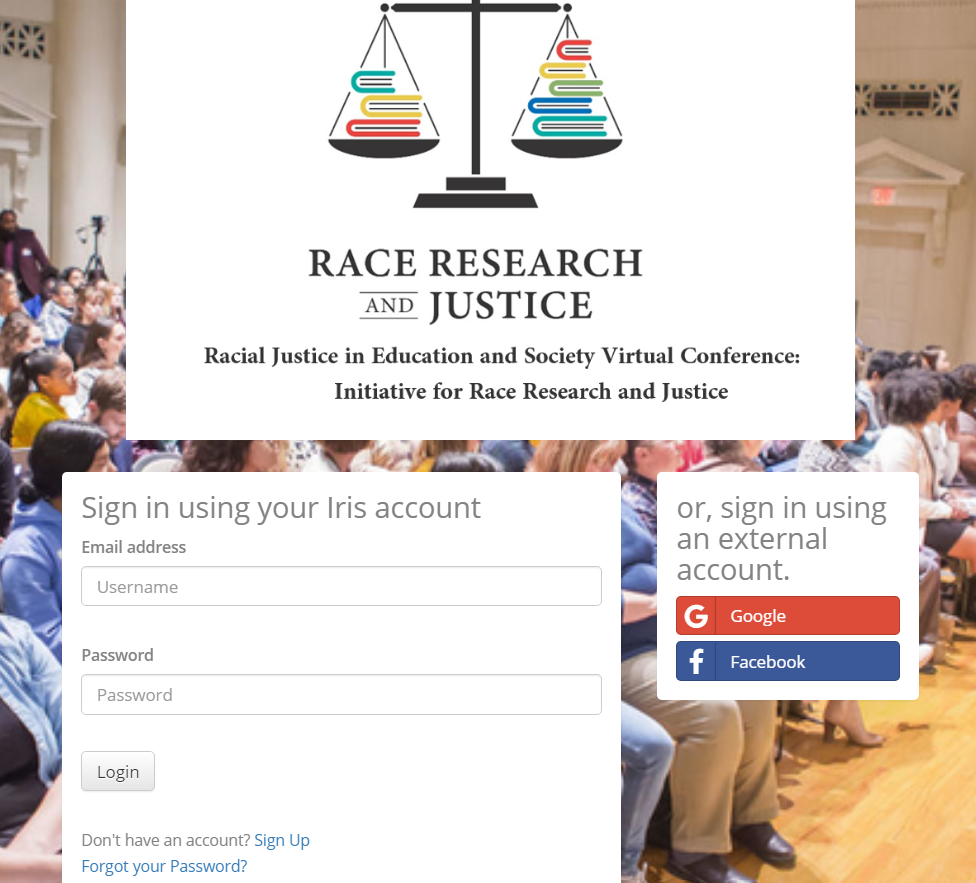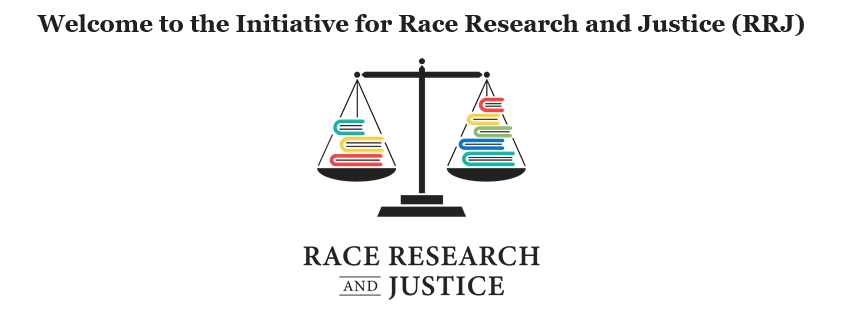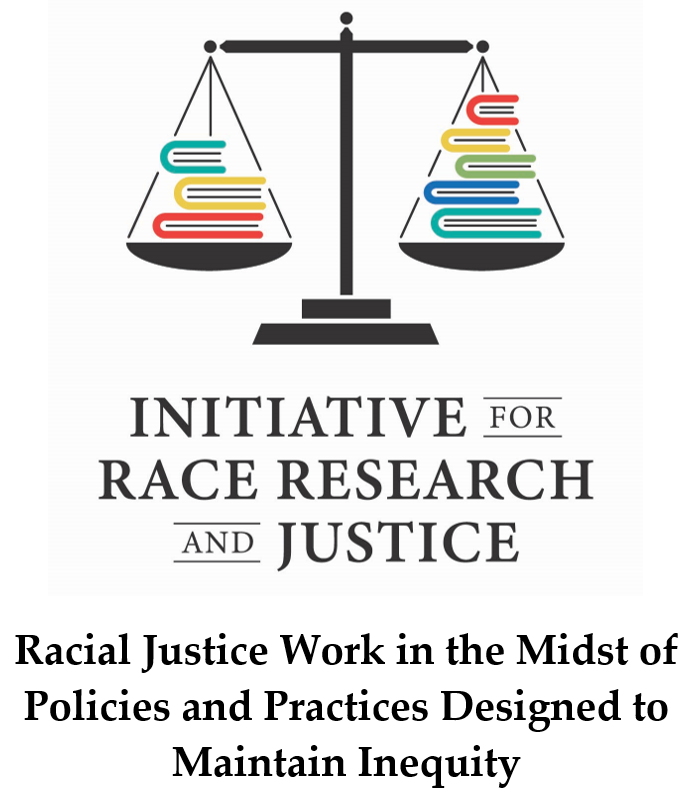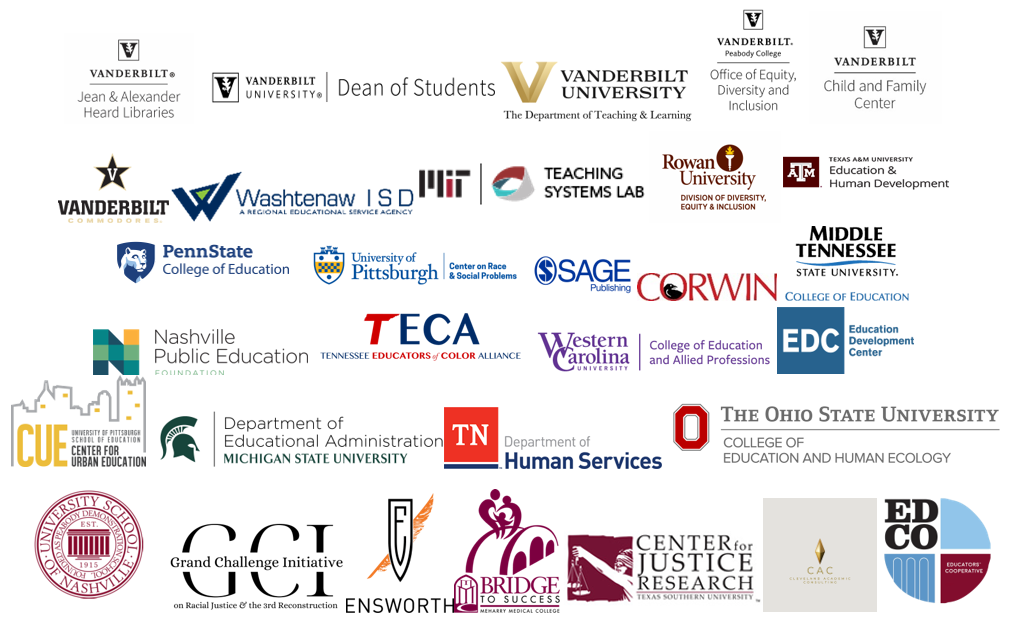2022 Jumpstart Virtual Conference
Hosted by the Initiative for Race Research and Justice
Date: Monday, August 1st, 9:00am - 4:00pm CST
Registration Fee: $20 General Admission, $10 Undergraduate/Graduate Students
(Book Included with Registration)
Keynote Speakers

Dr. Cheryl E. Matias was recently awarded the 2020 Mid-Career Award for her work on racial justice in teacher education at the premier organization, American Educational Research Association. She is a full professor and Director of Secondary Teacher Education at the University of Kentucky. Her research focuses on race and ethnic studies in education with a theoretical focus on critical race theory, critical whiteness studies, critical pedagogy, and feminism of color. Specifically, she uses a feminist of color approach to deconstruct the emotionality of whiteness in urban teacher education and how it impacts urban education. Her other research interest is on motherscholarship and supporting women of color and motherscholars in the academy.
Dr. D-L Stewart is Professor and Chair of the Higher Education Department in the Morgridge College of Education at the University of Denver. Dr. Stewart has served as an ACPA Senior Scholar and is now the 2022 Past President for the Association for the Study of Higher Education. Dr. Stewart’s scholarship focuses on issues of race and ethnicity, sexuality and gender, religion, faith, and spirituality, as well as teaching, and service to professional organizations and institutions across the nation.
Dr. Gholnecsar (Gholdy) Muhammad is an Associate Professor of Literacy, Language, and Culture at the University of Illinois at Chicago. She studies Black historical excellence within educational communities with goals of reframing curriculum and instruction today. Dr. Muhammad’s scholarship has appeared in leading academic journals and books, including Research in the Teaching of English, Urban Education, Journal of Adolescent and Adult Literacy, Language Arts, and Written Communication. She brings expertise, having served as a middle school teacher, literacy specialist, school district administrator, and school board president. She works with teachers, leaders, parents, and youth across the United States and South Africa in best practices in culturally and historically responsive instruction.
Opening Keynote Lecture: 9:00am-10:30am CST: Dr. Gholnecsar (Gholdy) Muhammad
Lecture Title: Cultivating Genius and Joy in Education through Culturally and Historically Responsive Pedagogies
Lecture Description:
In this keynote, Dr. Gholdy Muhammad offers a unique, culturally, and historically responsive approach to cultivating genius and joy in education. This approach is essential for accelerating the growth of all students and uniquely youth of color, who have been traditionally underserved in learning standards, policies, and school practices. She will present her equity framework, called the HILL Model, to help educators develop students’ histories, identities, literacies, and liberation.
Identity Development—Helping youth to make sense of who they are and others.
Skill Development— Helping youth to develop proficiencies across the content areas and state learning standards.
Intellectual Development—Helping youth gain new knowledge set into the context of the world.
Criticality—Helping youth name, understand, question, and disrupt oppression in the world.
Joy—Helping youth uplift beauty, aesthetics, truth, and personal space fulfillment within humanity.
Participants will learn and understand history and policy and personal and instructional factors that justify the need and purpose for culturally and historically responsive education. Educators will be encouraged and motivated to be more inclusive of their teaching of these five collective pursuits while learning the importance of integrating cultural, racial, linguistic, and historical responsiveness into their learning goals, lesson plans, and the texts they use to teach. Additionally, participants will see sample lesson/unit plans across grade levels, moving theory into action.
Keynote Lunch Lecture: 12:00pm-1:00pm CST: Dr. Cheryl Matias
Lecture Title: The Dangers of White Emotionalities: National Hysteria and Hullabaloo in CRT, Teaching, and Racial Justice
Lecture Description:
The US has seen a rise in national coverage regarding whether CRT is taught in classrooms and how it may impact our youth. Despite the fact that CRT is an analytic tool used mainly in higher educational research, the craze of whether it is taught in K-12 school and making white people feel guilty is all the rave. Notwithstanding this unsubstantiated hysteria and hullabaloo, this keynote will first address this national phenomenon, divulge what is CRT and its true relation to education (teaching and teacher education in particular), and ultimately reveal how dangerous the emotionalities of whiteness are in creating racial divides.
Closing Keynote Lecture: 2:30pm-4:00pm CST: Dr. D-L Stewart
Lecture Title: Ideologies of Absence: Anti-Blackness and Inclusion Rhetoric in Student Affairs Practice
Lecture Description:
Revisiting their 2019 article published in the Journal of Student Affairs, Dr. Stewart will discuss the ways anti-Blackness shapes the experiences of Black graduates and full-time professionals despite the profusion of inclusion rhetoric in student affairs literature and practice. The hypervisibility, yet invisibility, of Black graduates and full-time professionals subjects these workers to four types of absences Dr. Stewart will describe. In contrast, Black presences are offered as a path toward Black futurities in student affairs.
Please mark your calendar for Monday, August 1st, 2022 from 9:00am – 4:00pm CST for our virtual conference on Racial Justice in Education and Society.
Below is the agenda for the day.
9:00am-10:30am CST: Welcome/Opening Keynote Lecture: Dr. Gholnecsar Muhammad- all participants
10:45am-11:45am CST: Breakout sessions where participants will join a session based on interests.
- African Diasporic Literature Book Collections for Young Children: Dr. Gloria Swindler Boutte
- Beyond Diversity: Organizational Strategies for Advancing Racial Equity and Optimizing Student Access and Success Dr. Kelly Slay
- Beyond Headlines and Hysteria: Legal Implications for Banning Critical Race Theory: Dr. Dana Thompson Dorsey
- Centering Families to Support Children’s Learning in and Out of School: Dr. Lori Delale-O'Connor
- Expanding Canons in and Out of STEM through Critical Race Praxis: Dr. ReAnna S. Roby
- Five Practices for Equity-Focused School Leadership: Dr. Gretchen Generett & Dr. Sharon Radd
- From Prison Cells to PhD: Dr. Stanley Andrisse
- From School-to-Prison to School-to-College: Increasing College Opportunities for Black and Latinx Male Students: Dr. Quaylan Allen
- Hidden in (Virtual) Plain Sight: School Attendance Before, During, and 'After' COVID-19: Dr. Joshua Childs
- How Race, Culture, and Language Matter in Accessing Quality Science Education: Bryan Brown: Dr. Bryan Brown
- Listening For: Lenses on Belonging and the Needs of Underserved Students in Independent Schools: Caroline G. Blackwell
- Navigating the Journey to Culturally Responsive Teaching: Lessons from Black Women Educators: Dr. Abiola Farinde-Wu
- Project LIT in the Secondary English Classroom: Dr. Jarred Amato
- Racial Conflict, Violence and Trauma: Why Dialogues are Essential to Healing: Dr. Adam Alvarez
- Sports as a Medium of Empowerment for Black Girls and Women: Dr. Tomika Ferguson
- Supporting Teachers to Work with Immigrant Children and Families: Dr. Christina da Silva [Iddings
- Teachers Reclaiming Their Power: Dr. Judson Laughter
- Using PBIS to Ensure Racial Equity in School Discipline: Dr. Kent McIntosh
12:00pm-1:00pm CST: Keynote Lunch Lecture: Dr. Cheryl Matias -all participants
1:15pm-2:15pm CST: Breakout sessions where participants will join a session based on interests.
- African Diasporic Literature Book Collections for Young Children: Dr. Gloria Swindler Boutte
- Beyond Diversity: Organizational Strategies for Advancing Racial Equity and Optimizing Student Access and Success Dr. Kelly Slay
- Beyond Headlines and Hysteria: Legal Implications for Banning Critical Race Theory: Dr. Dana Thompson Dorsey
- Centering Families to Support Children’s Learning in and Out of School: Dr. Lori Delale-O'Connor
- Expanding Canons in and Out of STEM through Critical Race Praxis: Dr. ReAnna S. Roby
- Five Practices for Equity-Focused School Leadership: Dr. Gretchen Generett & Dr. Sharon Radd
- From Prison Cells to PhD: Dr. Stanley Andrisse
- Hidden in (Virtual) Plain Sight: School Attendance Before, During, and 'After' COVID-19: Dr. Joshua Childs
- How Race, Culture, and Language Matter in Accessing Quality Science Education: Bryan Brown: Dr. Bryan Brown
- Listening For: Lenses on Belonging and the Needs of Underserved Students in Independent Schools: Caroline G. Blackwell
- From School-to-Prison to School-to-College: Increasing College Opportunities for Black and Latinx Male Students: Dr. Quaylan Allen
- Navigating the Journey to Culturally Responsive Teaching: Lessons from Black Women Educators: Dr. Abiola Farinde-Wu
- Project LIT in the Secondary English Classroom: Dr. Jarred Amato
- Racial Conflict, Violence and Trauma: Why Dialogues are Essential to Healing: Dr. Adam Alvarez
- Sports as a Medium of Empowerment for Black Girls and Women: Dr. Tomika Ferguson
- Supporting Teachers to work with Immigrant Children and Families: Dr. Christina da Silva [Iddings]
- Teachers Reclaiming Their Power: Dr. Judson Laughter
- Using PBIS to Ensure Racial Equity in School Discipline: Dr. Kent McIntosh
2:30pm-4:00pm CST: Final Keynote Lecture and Closing: Dr. D-L Stewart - all participants
Session Title: African Diasporic Literature Book Collections for Young Children
Session Facilitator: Dr. Gloria Swindler Boutte
Session Description: Beginning with a discussion of African Diaspora Literacy, I present four principles for assembling African Diasporic Literature collections for young children. I provide guidance for developing comprehensive and continuous African Diasporic literature collections for P-3 classrooms and homes and offer a sample text set. A few examples of young children’s reflections on African Diaspora content are shared.
Session Title: Beyond Diversity: Organizational Strategies for Advancing Racial Equity and Optimizing Student Access and Success
Session Facilitator: Dr. Kelly Slay
Session Description: Amid a contentious policy environment for race-consciousness admissions, university leaders continue to leverage diversity initiatives, often aimed at attracting more “diverse” students. While institutions may strive to represent a commitment to diversity they often lack specificity with regard to racism and racial inequities. In this workshop, we will critically examine the use of diversity-focused enrollment management policies and approaches (e.g., admissions, recruitment, financial aid). We will explore the mismatch that often exists between institutional performances and proclamations of “diversity” and the experiences of Black, Indigenous, Latinx, and other racially minoritized undergraduate and graduate students. Finally, workshop attendees will learn equity-minded strategies for enhancing and sustaining racially diverse enrollments, including truth-telling and organizational learning.
Session Title: Beyond Headlines and Hysteria: Legal Implications for Banning Critical Race Theory
Session Facilitator: Dr. Dana Thompson Dorsey
Session Description: In this session, we will discuss what led to the social and political attacks on critical race theory (CRT) and the anti-CRT legislation that is being enacted across the country. In addition, we will address some of the legal implications for state governments, school districts, and higher education institutions that are trying to ban critical race theory in education.
Session Title: Centering Families to Support Children’s Learning in and Out of School
Session Facilitator: Dr. Lori Delale-O'Connor
Session Description: Families are an invaluable part of their children’s learning and development ecosystems. Relationships and interconnectedness between families, communities, and schools are important for both schools and out-of-school time (OST) programs and learning opportunities. In this workshop, we will focus on the different ways that Black, Indigenous, Latinx, and other racially minoritized families, families living in economic poverty, and those whose native language does not align with the dominant language support their young people’s learning experiences, as well as the barriers and gaps they face in pursuing learning experiences. We will then highlight ways for both in-school and OST educators to recognize and support the engagement of families by recognizing families’ strengths and reducing barriers to further foster their engagement.
Session Title: Expanding Canons in and Out of STEM through Critical Race Praxis
Session Facilitator: Dr. ReAnna S. Roby
Session Description: Black girls and Black women possess many STEM-related assets that may be under-valued in educational setting. This session focuses on why the needs of some Black adolescent girls and women in STEM education are not being met and what practitioners can (and should) do to build practices to build on the assets of students in prekindergarten – through higher education.
Session Title: Five Practices for Equity-Focused School Leadership
Session Facilitator: Dr. Gretchen Generett & Dr. Sharon Radd
Session Description: This session discusses how educational leaders can build equity-driven school teams, replace the status quo, and support inclusion and educational excellence. The session lifts up core themes in the book, Five Practices for Equity-Focused School Leadership, designed to offer a roadmap to educators and school leaders, including exploration of identities, leading with equity, and how to design equity-focused systems. During the session, the facilitators will address how people can enter this work, engage across differences, and how equity-focused school leadership relates to policy.
Session Title: From Prison Cells to PhD
Session Facilitator: Dr. Stanley Andrisse
Session Description: In this breakout session, Stanley Andrisse will discuss how growing up in Ferguson, Missouri, he began making poor decisions at a very young age. He started selling dope and was arrested for the first time at fourteen years old. By his early twenties, dope dealing had exponentially multiplied, and he found himself sitting in front of a judge facing twenty years to life on drug trafficking charges. While challenged with a strong desire for self-renewal, he faced an environment that was not conducive for transformative change. From poor institutional structure and policies to individual institutionalized thinking and behaviors, he battled on a daily basis to retain and maintain his humanity. His talk will culminate with his experience after being released, and after several rejections, earning a PhD/MBA simultaneously and becoming an endocrinologist and impactful leader at Johns Hopkins Medicine, specializing in diabetes research.
Session Title: From School-to-Prison to School-to-College: Increasing College Opportunities for Black and Latinx Male Students
Session Facilitator: Dr. Quaylan Allen
Session Description: This session will discuss the possibilities of disrupting the school to prison pipeline for Black and LatinX males by increasing their opportunities to participate in the school to college pipeline. The presentation will begin with a brief review of the educational and social outcomes for Black and LatinX males. Particular attention will be given to the ways that race and gender intersect in the educational experiences and outcomes for Black and LatinX men. This includes topics such as the school-to-prison pipeline and factors related to college access and enrollment. The workshop will then offer best practices and tools towards increasing the opportunities for Black and LatinX males to participate in a school to college pipeline through the use of school, community, and university practices and partnerships. The session might be of interest to educators, parents, and community based organizations working with Black and LatinX males, and are interested in topics related to college readiness, college access, and Black and Latinx male success.
Session Title: Hidden in (Virtual) Plain Sight: School Attendance Before, During, and 'After' COVID-19
Session Facilitator: Dr. Joshua Childs
Session Description: Getting kids to school has been an important educational endeavor for centuries. In recent years, scholars around the world have studied a variety of strategies, interventions, policies, and educational practices that could be useful for helping kids attend school more frequently. However, the ongoing COVID-19 pandemic has brought to the surface new attendance issues caused by classroom disruptions, school closures, and misalignment between health and education policies. So what are some of the ways educators can engage and help facilitate school attendance improvement in local schools and districts? In this presentation, I will discuss some of the latest data from around the country on school attendance and current strategies many communities have initiated during the pandemic to help improve school attendance. I'll also explain some of the latest research on school attendance and how it can provide helpful insights for community stakeholders to become more involved in school attendance policies and practices.
Session Title: How Race, Culture, and Language Matter in Accessing Quality Science Education
Session Facilitator: Dr. Bryan Brown
Session Description: The pipeline analogy in science is flawed. It presents an image of single direction to success in scientific fields. The data on matriculation rates in STEM for underrepresented groups paints a picture of a complex matrix of psychological, social, and pedagogical features that promote success and failure in science. Through a review of existing research, Dr. Brown will re-examine the assumptions that leaders make about this matrix. There are several examples of successful STEM communities for those who are traditionally marginalized. These examples share a common reliance on social support, psychological support, and pedagogical preparations. This presentation will explore how each of these critical factors moves us from spectators in the discussion about matriculation rates to leaders who design STEM environments where everyone thrives.
Session Title: Listening For: Lenses on Belonging and the Needs of Underserved Students in Independent Schools
Session Facilitator: Caroline G. Blackwell
Session Description: What do we “listen for” when trying to understand what promotes belonging and well-being among students who occupy minority statuses in independent schools? How do your background and experience amplify or drown out critical messages in the stories you hear? How does who and what you see (and not see) shape narratives about belonging and drive practice and policy decisions that expand or contract student engagement and success? What skills and resources can you access to amplify and invite in the stories, ways of knowing, and understanding that you most need to hear? This experiential session will introduce participants to inner development goals and reliable processes for listening to and interpreting stories of belonging and other student and family needs in ways that cultivate greater achievement, safety, and well-being in our schools.
Session Title: Navigating the Journey to Culturally Responsive Teaching: Lessons from Black Women Educators
Session Facilitator: Dr. Abiola Farinde-Wu
Session Description: Informed by Dr. Farinde-Wu’s field interviews with and observations of Black women educators, this culturally responsive pedagogy session will examine the ways in which students’ race, cultures, and ethnicities should influence teacher pedagogy. First, participants will gain a firm understanding on what it means to be culturally responsive. Second, we will explore our own positionalities and how our beliefs, attitudes, biases, dispositions, prejudices, values, and world views impact how we teach students from backgrounds different from our own. Lastly, affirming and moving beyond the belief of “but that’s just good teaching,” we will interrogate case study examples that center racial-ethnic student groups and teaching strategies.
Session Title: Project LIT in the Secondary English Classroom
Session Facilitator: Dr. Jarred Amato
Session Description: Join Jarred Amato as we continue to reimagine literacy at the middle and high school level and reignite all students’ love of reading in the years ahead. In this session, we will reflect on the Project LIT journey, which began in one classroom at Maplewood High School and now includes approximately 2,000 schools across the country. We will explore what it looks like to lead a Project LIT chapter, outline the benefits for students and educators, examine how it fits into the secondary English classroom, and offer solutions to the challenges that many educators are facing in 2022. Attendees will also leave with dozens of Middle Grade and Young Adult book recommendations along with the resources needed to launch their own Project LIT chapter in their school and/or community.
Session Title: Racial Conflict, Violence and Trauma: Why Dialogues are Essential to Healing
Session Facilitator: Dr. Adam Alvarez
Session Description: How can people come together to discuss racial conflicts and trauma? This session begins with a structural interpretation of racial conflict. Then, we discuss the nature of violence and how it sets the stage for traumatic experiences. Finally, we discuss possibilities for engaging in disruptive movements of solidarity across identity sites, especially race. By sharing examples of disruptive movements, participants are invited to think and dialogue about how disruptive movements of solidarity may be developed in and around educational contexts. The goal is to encourage participants to engage in movements that can contribute to young people's healing.
Session Title: Sports as a Medium of Empowerment for Black Girls and Women
Session Facilitator: Dr. Tomika Ferguson
Session Description: Participation in sports is seen as a path for social mobility within the Black community and youth are often pushed towards sports at an early age. The impact of sports participation for Black girls and women is not always incongruent to social expectations and worthy of further exploration. This workshop will present research about Black girls’ and women’s sporting experience from high school through professional sports. We will consider how concepts such athlete activism, college-going school cultures, and name-image-likeness (NIL) legislation are opportunities for empowerment for Black girls and women in sport. Further, we will co-develop strategies for policymakers, school leaders, and sport administrators to employ to enhance the sporting experience for Black girls and women athletes.
Session Title: Supporting Teachers to Work with Immigrant Children and Families
Session Facilitator: Dr. Christina da Silva [Iddings]
Session Description: Discussions about improving learning opportunities and educational equity for young children have been at the top of educational agendas in the U.S. These discussions have been intensified in the last couple of years due to restrictions in learning environments imposed by COVID-19. However, often missing from such conversations are the aggravated sociopolitical challenges facing immigrant children and families—a population that has been disproportionately impacted by the pandemic. Further missing are discussions about how best to prepare and support teachers to be responsive to the deep educational inequities and challenges laid bare by COVID-19 with respect to immigrant and refugee children. In this presentation, I will outline ways by which teachers, families, community organizers, and university faculty and students, can work together to expand capacity to create and enact 1) new contexts for advocacy action, 2) new forms of school, family, and community connections, and 3) new circulations of languages and literacies across households, classrooms, and communities.
Session Title: Teachers Reclaiming Their Power
Session Facilitator: Dr. Judson Laughter
Session Description: States and districts may set educational policies, but teachers are the ones who implement policy. As such, educational policies represent sites of negotiation between an institution and an individual. Teachers interested in antiracism and social justice need tools to interpret policies toward equitable ends. In this breakout session, we will explore Critical AntiRacist Discourse Analysis (CARDA), a tool designed to unmask and unmake systemic racism as expressed in institutional policy. We will examine how CARDA can be used to uncover implicit racism and pursue antiracism in the implementation of several types of educational policy documents, including syllabi, scripted curricula, and learning standards
Session Title: Using PBIS to Ensure Racial Equity in School Discipline
Session Facilitator: Dr. Kent McIntosh
Session Description: Schools across the U.S. are implementing PBIS in efforts to reduce racial disproportionality in school discipline, and overall, research shows that schools implementing PBIS with fidelity have more equitable school discipline. Yet eliminating disparities through standard PBIS implementation, without attention to the sociocultural context and systems that perpetuate inequities, is unlikely to produce desired outcomes. The presenters will share specific strategies and free Center resources for increasing equity in PBIS systems.
A Special Thank You to Our Co-Sponsors!
Vanderbilt Athletics
Vanderbilt Libraries
Vanderbilt Child and Family Center
Vanderbilt Peabody College of Equity, Diversity and Inclusion
Vanderbilt Office of the Dean of Students
Vanderbilt Peabody College
Department of Teaching and Learning
Vanderbilt Racial Justice Lab
Vanderbilt University Grand Challenge Initiative on Racial Justice and the Third Reconstruction (RJ3R)
University School of Nashville
Middle Tennessee State University College of Education
Western Carolina University College of Education and Allied Professions
Educators Cooperative
Massachusetts Institute of Technology Teaching Systems Lab
SAGE/Corwin
Texas Southern University Center for Justice Research
University of Pittsburgh Center on Race and Social Problems
Rowan University Division of Diversity, Equity and Inclusion
University of Pittsburgh Center for Urban Education
Ensworth
Penn State University -Wayne K. and Anita Woolfolk Hoy Endowed Professorship, Educational Leadership Program
Washtenaw Intermediate School District
Nashville Public Education Foundation
The Ohio State University College of Education and Human Ecology
Texas A&M University College of Education and Human Development
Tennessee Educators of Color Alliance
Education Development Center
Cleveland Academic Consulting
Michigan State University- Department of Educational Administration
The B.R.I.D.G.E. to Success Program at Meharry Medical College
Tennessee Department of Human Services
Every Iris Registration user must create an account for security purposes. This login will help keep your information safe as you register for the conference.
After clicking Register Now above, you will reach this page example below. Click Sign Up to make an account with your email and a password and then proceed to register for the conference.
Example:

*If you have to leave your registration and are prompted for a code when you return, please use RRJ22.*
Example:

Questions? Please email us at rrj@vanderbilt.edu.

Dr. Rich Milner founded the Initiative for Race Research and Justice (RRJ) in the fall of 2018. His goal was to centralize and bring together research and researchers focused on race inside and outside the field of education. RRJ has an overt emphasis on studying and impacting practices and policies toward racial justice. For instance, how do we build from innovative, interdisciplinary race research to improve the human condition?
Since 2018, the initiative has expanded under the collaboration and support of Dr. Wonder Drake and Dr. Graham Reside.
In short, RRJ’s work is organized around three main focal areas: (1) conducting high quality research on race; (2) using new and expanded knowledge to improve practices, policies, society, and the overall human condition; and (3) sharing and disseminating knowledge, resources, and tools in collaboration with communities, organizations, and institutions for racial justice.
Please click here to read and subscribe to our newsletter.

